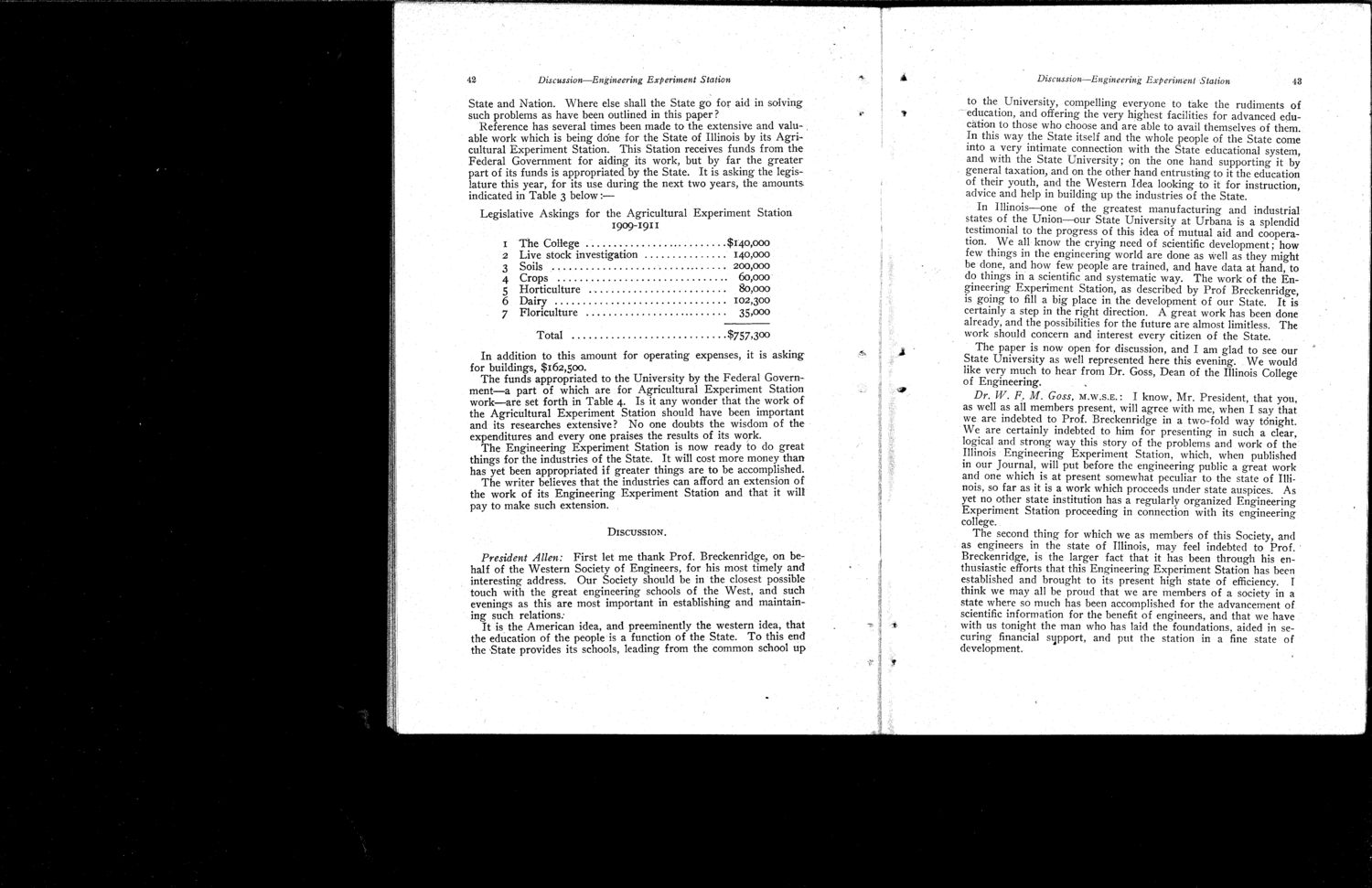| |
| |
Caption: Booklet - Engineering Experiment Station and Industry (1909)
This is a reduced-resolution page image for fast online browsing.

EXTRACTED TEXT FROM PAGE:
42 Discussion—Engineering Experiment Station Discussion—Engineering Experiment Station 43 State and Nation. Where else shall the State go for aid in solving such problems as have been outlined in this paper ? Reference has several times been made to the extensive and valu- . able work which is being done for the State of Illinois by its Agricultural Experiment Station. This Station receives funds from the Federal Government for aiding its work, but by far the greater part of its funds is appropriated by the State. It is asking the legislature this year, for its use during the next two years, the amounts indicated in Table 3 below :— Legislative Askings for the Agricultural Experiment Station 1909-1911 1 2 3 4 5 6 7 The Colfege ." . Live stock investigation Soils . . . . . . . . Crops . . Horticulture Dairy Floriculture Total .. • . . . . . . . $140,000 140,000 . 200,000 60,000 80,000 102,300 35,ooo $757,300 In addition to this amount for operating expenses, it is asking for buildings, $162,500. The funds appropriated to the University by the Federal Government—a part of which are for Agricultural Experiment Station work—are set forth in Table 4. Is it any wonder that the work of the Agricultural Experiment Station should have been important and its researches extensive? No one doubts the wisdom of the expenditures and every one praises the results of its work. The Engineering Experiment Station is now ready to do great things for the industries of the State. It will cost more money than has yet been appropriated if greater things are to be accomplished. The writer believes that the industries can afford an extension of the work of its Engineering Experiment Station and that it will pay to make such extension. DISCUSSION. President Allen: First let me thank Prof. Breckenridge, on behalf of the Western Society of Engineers, for his most timely and interesting address. Our Society should be in the closest possible touch with the great engineering schools of the West, and such evenings as this are most important in establishing and maintaining such relations: It is the American idea, and preeminently the western idea, that the education of the people is a function of the State. To this end the State provides its schools, leading from the common school up to the University, compelling everyone to take the rudiments of education, and offering the very highest facilities for advanced education to those who choose and are able to avail themselves of them. In this way the State itself and the whole people of the State come into a very intimate connection with the State educational system, and with the State University; on the one hand supporting it by general taxation, and on the other hand entrusting to it the education of their youth, and the Western Idea looking to it for instruction, advice and help in building up the industries of the State. In Illinois—one of the greatest manufacturing and industrial states of the Union—our State University at Urbana is a splendid testimonial to the progress of this idea of mutual aid and cooperation. We all know the crying need of scientific development; how few things in the engineering world are done as well as they might be done, and how few people are trained, and have data at hand, to do things in a scientific and systematic way. The work of the Engineering Experiment Station, as described by Prof Breckenridge, is going to fill a big place in the development of our State. It is certainly a step in the right direction. A great work has been done already, and the possibilities for the future are almost limitless. The work should concern and interest every citizen of the State. The paper is now open for discussion, and I am glad to see our State University as well represented here this evening. We would like very much to hear from Dr. Goss, Dean of the Illinois College of Engineering. V Dr. W. F. M. Goss, M.W.S.E.: I know, Mr. President, that you, as well as all members present, will agree with me, when I say that we are indebted to Prof. Breckenridge in a two-fold way tonight. We are certainly indebted to him for presenting in such a clear, logical and strong way this story of the problems and work of the Illinois Engineering Experiment Station, which, when published in our Journal, will put before the engineering public a great work and one which is at present somewhat peculiar to the state of Illinois, so far as it is a work which proceeds under state auspices. As yet no other state institution has a regularly organized Engineering Experiment Station proceeding in connection with its engineering college. The second thing for which we as members of this Society, and as engineers in the state of Illinois, may feel indebted to Prof. Breckenridge, is the larger fact that it has been through his enthusiastic efforts that this Engineering Experiment Station has been established and brought to its present high state of efficiency. T think we may all be proud that we are members of a society in a state where so much has been accomplished for the advancement of scientific information for the benefit of engineers., and that we have with us tonight the man who has laid the foundations, aided in securing financial support, and put the station in a fine state of development.
| |